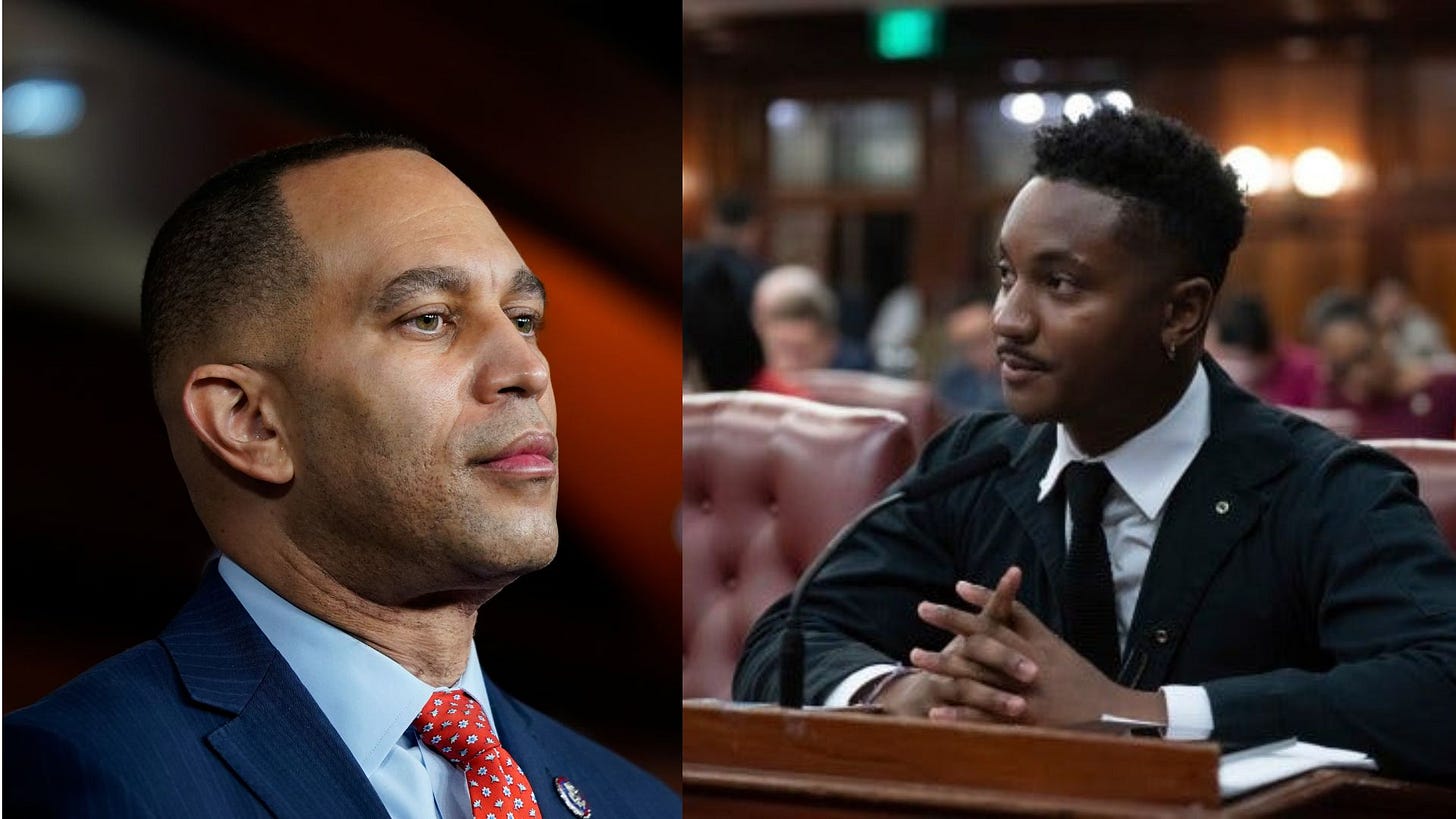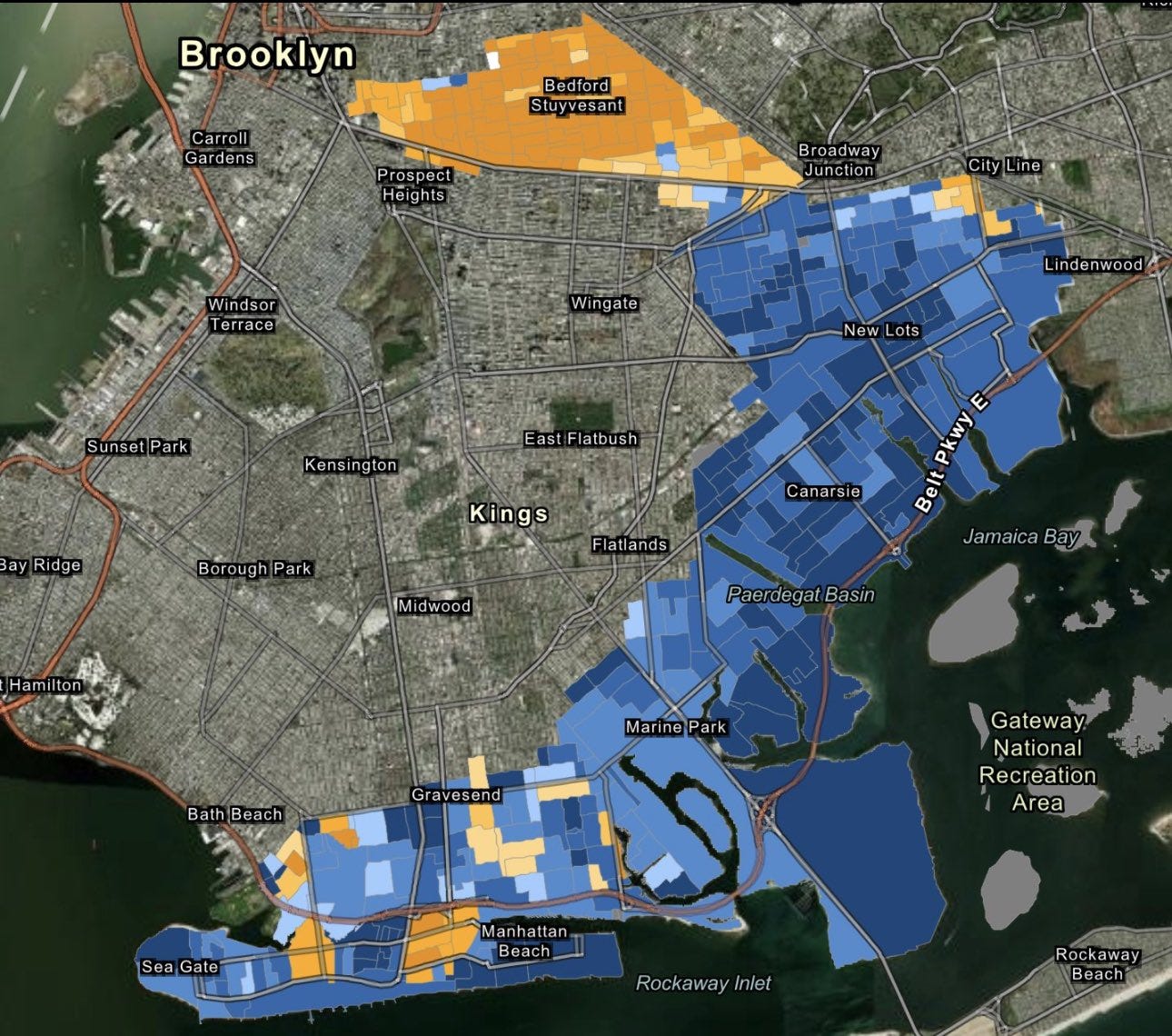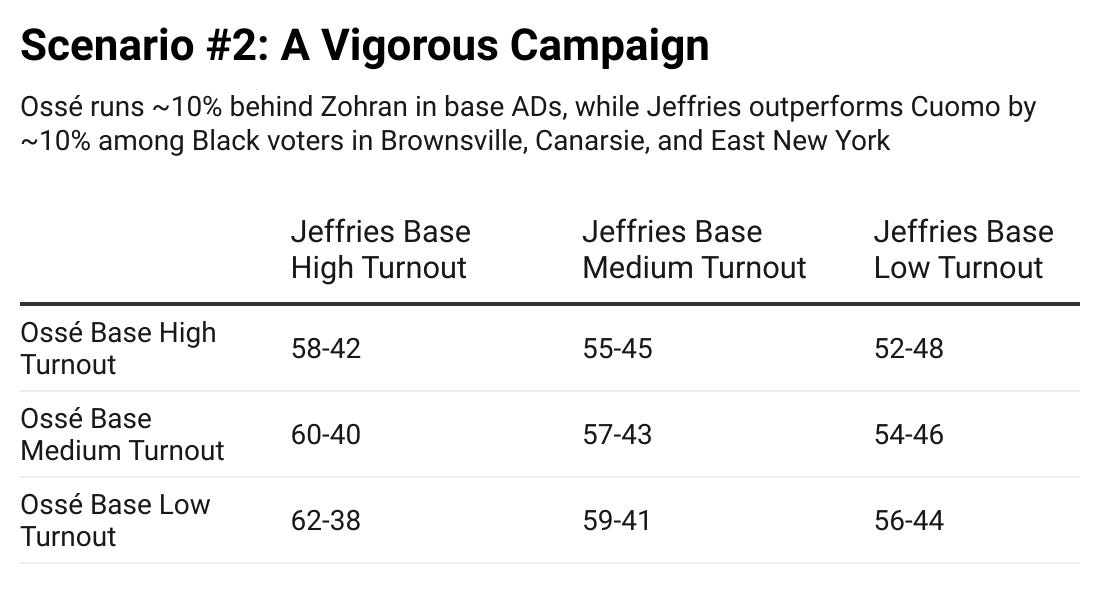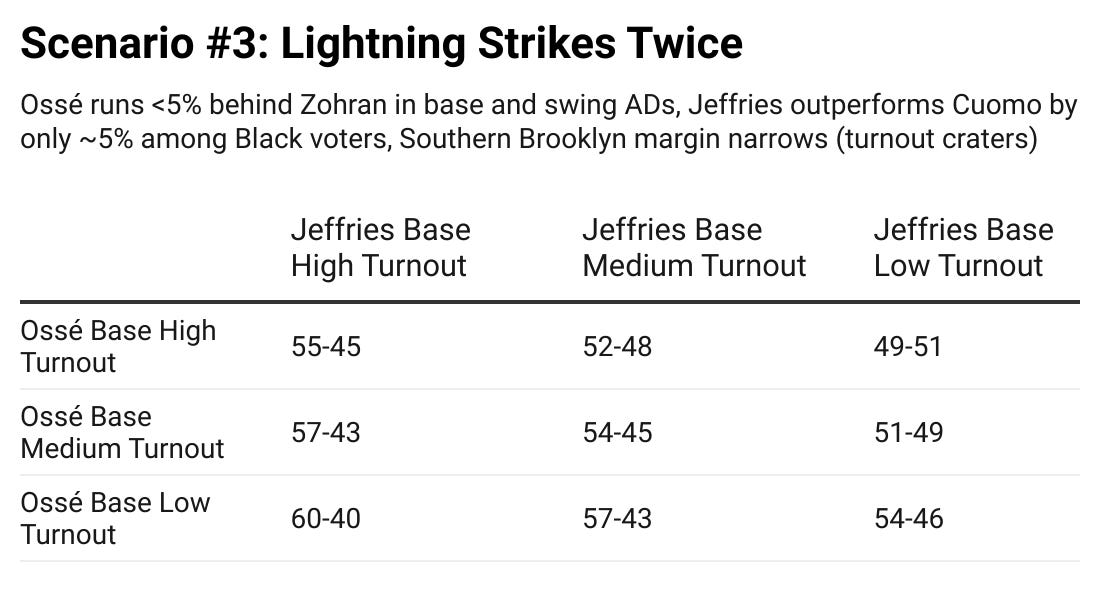Can Chi Ossé beat Hakeem Jeffries?
Will lightning strike twice?
Yesterday, Brooklyn City Council Member Chi Ossé filed to run against House Democratic Leader Hakeem Jeffries, who represents New York’s 8th Congressional District. Immediately, the contest would become one of the highest profile races in the nation: pitting an ascendant and insurgent democratic socialist movement against the Democratic Party’s moderate establishment at the heart of Black Brooklyn.
Ossé, the youngest person ever to be elected to the New York City Council, has earned plaudits for an impressive understanding of new media. Beating back Central Brooklyn’s atrophying Democratic machine, Ossé won his Council seat four years ago with little institutional support, a guerrilla effort of door knocking, creative mailers, and millennial-focused social media. His chief legislative accomplishment, the FARE Act, which prohibits the act of charging tenants for the fees of a broker retained by the landlord, was one of the most renter-friendly (and impressive) legislative accomplishments over the past few years. Armed with robust communicative instincts, Ossé’s future is undeniably bright; a twenty-seven year old talent that could easily raise millions of dollars and galvanize scores of volunteers.
Nonetheless, Ossé is choosing one of the steepest hills to climb, given Hakeem Jeffries has remained a powerful fixture of Brooklyn politics for two decades. Jeffries ran for State Assembly twice versus incumbent Roger Green (ironically, the young corporate lawyer campaigning on “change” and “reform” was the top choice of the urban professional class he now openly derides) but lost both times, only to luck into a vacancy when Green (foolheartedly) ran for Congress. As a legislator, Jeffries played a key role in the passage of several criminal justice reform bills, while his campaign coffers remained flush with funds from Wall Street and corporate law networks. Rep. Ed Towns, who once succeeded the “unbought and unbossed” Shirley Chisholm, looked increasingly vulnerable; barely winning re-election and struggling to raise money. While one to discourage such efforts today, Jeffries launched a “soft” primary challenge to the declining Towns, stockpiling funds and stoking speculation. The gambit worked, and pushed the seventy-eight year old incumbent to retire rather than stare down certain defeat, leaving Jeffries to crush City Council Member (and former Black Panther) Charles Barron, whom the future Democratic leader derided as needlessly divisive and antisemitic. Since then, Jeffries has never faced a competitive election; both a sign of genuine strength in this era of primary challenges and a potential liability. Were Democrats to retake the lower chamber next year, Jeffries would be in line to be the next Speaker of the House.
In local politics, Jeffries maintains a lower-profile. He has repeatedly sparred with NYC-DSA, whom his spokesperson (a transplant himself) has referred to as “Team Gentrification.” Jeffries also counts relatively few tried-and-true allies (Stefani Zinerman, Chris Banks, Nikki Lucas), compared to his Congressional contemporaries, such as Alexandria Ocasio-Cortez and Nydia Velázquez. He eschewed allying himself with Eric Adams, who concurrently rose through Black Brooklyn politics, but took a hands off approach with respect to the Mayor’s myriad of scandals. This year, the House Democratic Leader sat out the Democratic Primary for Mayor; only issuing a tepid endorsement of Zohran Mamdani once the result was beyond doubt. Nonetheless, while Jeffries is not the local political player that some of his predecessors were, the Brooklyn representative remains closely allied with organized labor, the Governor, and the state’s Congressional delegation. Most importantly, for the purposes of this discussion, Jeffries remains well-liked throughout his majority-Black, working and middle-class district.
New York’s 8th Congressional District spans more than a dozen neighborhoods in Brooklyn, stretching from gentrifying Clinton Hill and Bedford-Stuyvesant through many of the city’s pre-eminent Black communities: low-income Brownsville and East New York, middle-class Canarsie and Flatlands. The Southern Brooklyn portion — which includes Sheepshead Bay, Gravesend, Brighton Beach and Coney Island — remains a sizable geographic portion, home to many (more politically conservative) immigrants from the former Soviet Union, who scarcely contribute in Democratic Primaries. Hence, the vast majority of the Democratic Primary electorate in NY-8 comes from either the district’s left-leaning gentrifying pockets (college-educated, renter-majority, younger) or its predominantly Black neighborhoods (diverse class character, older, less college-educated), where politics is less ideological, but more centered on institutions and relationships. In the Democratic Primary for Mayor, Zohran Mamdani defeated Andrew Cuomo 55.8% to 44.2% across the 8th Congressional District. Mamdani won by thrashing Cuomo in both Clinton Hill and Bedford-Stuyvesant (76% to 24%), blanketing the tree-lined, brownstone blocks of Central Brooklyn with enthusiastic canvassers, while maximizing young voter turnout with sharp messaging and attentional hegemony (to voters under the age of 45, Mamdani was ubiquitous). In neighboring Canarsie and East New York, Cuomo outpaced Mamdani by more than thirty percent, but voter turnout noticeably lagged behind the district’s (increasingly) white-collar precincts. And, among middle-aged Black voters, particularly in Bedford-Stuyvesant, Mamdani made traceable inroads, which reduced Cuomo to relying solely on older voters, whom he struggled to motivate to the polls en masse. While the Russian Jews of Trump Village, Manhattan Beach, and Sea Gate broke for the avowedly pro-Israel Cuomo, as did the moderate Italians and Irish of Marine Park and Mill Basin, preferring centrism over socialism, their relatively few votes could not save the former Governor.
Theoretically, couldn’t Chi Ossé simply replicate a version of the Mamdani Coalition?
Unfortunately, it’s not so simple. Comparing Mamdani–Cuomo to Ossé–Jeffries is a natural impulse, but one that should be exercised with nuance. Jeffries, for all of the concern over his lackluster response to President Trump’s authoritarian administration (narratives that are, in my estimation, largely confined to white-collar media), remains scandal-free (unlike Cuomo) and broadly popular with his working-class Black constituents. While not a wartime consigliere, Jeffries remains difficult to negatively define (as opposed to the perpetually stumbling Chuck Schumer), even for Republicans. As the House Democratic Leader, Jeffries will have unlimited money at his disposal, through both his campaign and aligned Independent Expenditures.
To many on the left, Hakeem Jeffries is a clear villain, the symbol of Democratic establishment unable to meet the political moment: feckless when standing up to Donald Trump, complicit as Gaza is reduced to rubble. The question is whether Black voters in Brooklyn, the heart and soul of the 8th District, view Hakeem — the man who comes to their churches on Sunday, who has represented them for over a decade, and is now the most visible Black political leader in America — feel the same way?
In defeating Cuomo, the Mamdani Coalition spanned a remarkably big tent: NYC-DSA, The Working Families Party, DC37, Letitia James, Alexandria Ocasio-Cortez, Bernie Sanders. Pending a forum vote tomorrow evening, the New York City chapter of the Democratic Socialists of America may decide to back Ossé. But who else, among those aforementioned institutions, would line up behind Ossé’s challenge to the Democratic leader? The Working Families Party, who eschewed supporting a viable DSA challenger to Jeffries-ally Stefani Zinerman last year, and will assuredly work alongside Jeffries to flip House districts across New York, has little incentive to wage war with the Minority Leader. Rep. Alexandria Ocasio-Cortez told Axios yesterday, “I certainly don’t think a primary challenge to the leader is a good idea right now.” Attorney General Letitia James would endorse Jeffries upon request, as would the state’s largest labor unions, who count thousands of members in Black Brooklyn.
And, of course, the man who cohered said Rainbow coalition, mayor-elect Zohran Mamdani, has repeatedly stressed his opposition.
For a house divided against itself cannot stand.
Defeating Jeffries, even with a left-progressive coalition similar to Mamdani’s, would be a herculean task. Without it, the endeavor is lonely and fraught. Most importantly, candidates and coalitions shape (and change) the electorate. Mamdani did this tremendously well, leveraging the political moment into a movement campaign, while maximizing his base on all fronts. However, in a citywide campaign, Mamdani could pull votes from every neighborhood, and maintained many paths to the nomination. Cuomo, need it be repeated, ran a listless and uninspiring effort, overly reliant on money, while failing to motivate his base of older Black and Hispanic Democrats. Jeffries, while marooned in Washington for days and weeks at a time (perhaps his greatest vulnerability), will have the time and money to tend to his working and middle-class base, and enough surrogates to fill in the gaps. While Zohran Mamdani received more votes (39K) than Andrew Cuomo (32K) in NY-8; Eric Adams , the son of Black Brooklyn whose electoral profile is more comparable to Jeffries, won more raw votes than either in 2021 (41K).
The electorate that comes to the polls in 2026 will not so neatly mirror that of 2025.
Undeniably, the stakes are high, even existential. An Ossé victory over Jeffries, comparable to Eric Cantor’s defeat at the hands of the Tea Party in 2014, would have the potential to realign the Democratic Party, and provide another devastating blow to the AIPAC. With another round of redistricting looming in 2028, and the Democratic base seething with anger towards the Party’s leadership, it’s now or never.
A generational opportunity to strike while the iron is hot? Or a mirage that threatens to bitterly divide an otherwise ascendant left coalition?
Zohran Mamdani, mere weeks removed from a General Election mandate, is at the center of this dispute. Already, Mamdani and Ossé, erstwhile allies, have reportedly fallen out. Mamdani, days away from entering City Hall, is unsettled by the prospect of being tangled up in an ugly, high-profile brawl that lacks upside for his state-sponsored agenda. The stakes would be raised further were NYC-DSA, Mamdani’s self-proclaimed “political home,” to lead the effort behind Ossé to unseat the face of Black political power in America. As Jeffries was asked ad nauseam over the summer whether he would endorse Mamdani, the reverse would be true for Mamdani’s first six months in office, oxygen deprived from his affordability agenda. After more than a year of carefully constructing a coalition, which finally came to include a majority of Black New Yorkers, the mayor-elect is reluctant to pick intra-Party fights.
This time last year, the left had nothing to lose by wholeheartedly supporting Zohran Mamdani. Now, Mamdani is one of the three most celebrated politicians in the United States, with an unrivaled megaphone to communicate his vision and beliefs. His success or failure, over the next four years, will have repercussions far beyond himself or New York City. Suddenly, there is everything to lose.
But does Mamdani’s base, who helped him get there, feel the same way?
Connect With Me:
Follow me on Twitter @MichaelLangeNYC
Email me at Michael.James.Lange@gmail.com







As a leftist who cares deeply about being tactical in everything we say and do—I think Zohran is absolutely right to stay out of this—let me make this case for Osse.
The left in a position of borderline unprecedented momentum and strength. We have at our disposal an enormously unpopular Republican administration and an enormously unpopular Democratic establishment. Those two things are so incredibly difficult to get at the same time, and it’s imperative that we use this situation to acquire as much power in the coming years as humanly possible.
I don’t think it’s true that the anti-establishment backlash within the Democratic Party is confined to educated, informed voters. A multitude of polls, elections, and vibes suggest that the sense that Dem leaders are weak and incapable of meeting the moment is a consensus held by a supermajority of the rank and file.
Osse won’t win by running a normal race centered around the district, but if he nationalizes the contest and makes it a referendum on the establishment in general, he has a nonzero chance. “Do you think Democratic leaders are doing a good job standing up to Trump,” should be plastered on every bit of Osse’s messaging.
As a leftist who wants Jeffries out, I think Mamdani has the right idea in that even if it's the morally correct thing, it may be politically counterproductive, especially if a hypothetical Jeffries ousting results in a further right/more competent House Minority Leader/Speaker.
It's not like I'm rooting for Jeffries, but the big heads of the progressive movement *probably* have the right idea washing their hands of this.